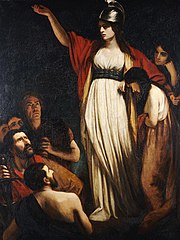On Women Warriors
August 7, 2009
Boudicca Haranguing the Britons by John Opie
History has known a few great women warriors, such as Boudicca, who led the Iceni tribe of Briton in battle against the Romans. But, the normalization of women in combat is a sign of the weakening of a nation’s will to defend itself.
On the subject of women leaders and warriors, Rose writes:
Your other commenter has caused me to ponder the topic of warlike females. I know that many conservatives are displeased by popularity of women-warriors in modern culture, but I believe that they are wrong when they say that the phenomenon is driven only by political correctness.
However rare they are in real world, it cannot be denied that male artists and myth-makers throughout history have for some reason found the idea extremely appealing. Men created Athena, the Amazons, Camilla, and the many lady-knights that appear in Spenser, Boiardo, Arioste, and Tasso. Indeed, Spenser laments in Canto IV of The Faerie Queene the scarcity of warrioresses in his own day:
“Where is the antique glory now become,
What whilom wont in women to appear?
Where be the brave achievements doen by some?
Where be the battles, where the shield and spear,
And all the conquests, which them high did rear,
That matter made for famous poet’s verse,
And boastful men so oft abashed to hear?
Bene theyall dead, and laid in doleful hearse?
Or doen they only sleep, and shall again reverse?
There is however, is major difference between these older portrayals and the post-feminist Amazons of modern cinema in that classical fighting women, like the knight Britomart in Spenser and Eowyn in Tolkien, will eventually put aside their swords and embrace their proper maternal role. Britomart must defeat Radigund—the Amazon Queen who has enslaved her future husband Sir Artegal and forced him to wear lady’s garments—and thus restore male rule and the natural order. Britomart can (and does) best Artegal in battle, but her years as a fighter are aberrational, a youthful lark before she takes her rightful place as loyal wife and mother. In this way, Spenser’s women-warriors are like the transvestite heroines of Shakespeare’s comedies who are allowed to play at being a man for a little while before ultimately being given in marriage. Yes, the common social good in the end must always triumph, but wasn’t great fun had in the meantime?
Actually, thinking about the topic made me recall Walter Otto’s speculation in his The Homeric Gods why the Greeks worshipped a battle-goddess and I’ve sought out the passage. He first suggests that perhaps “Athena is a woman because the proud heroes who accepted her guidance would not so readily have yielded to a man, even if he were a god.” However, he finds this answer insufficient and goes on to say,
“In Apollo we recognize the wholly masculine man. The aristocratic aloofness, the superiority of cognition, the sense of proportion, these and other related traits in a man, even music in the broadest sense of the word, are, in the last analysis, alien to a woman. Apollo is all these things. But perfection in the living present, untrammeled and victorious action, not in the service of some remote and infinite idea but for mastery over the moment—that is the triumph which has always delighted woman in a man, to which she inspires him, and whose high satisfaction he can learn from her. The divine precision of the well-planned deed, the readiness to be forceful and merciless, the unflagging will to victory—this, paradoxical as it may sound, is women’s gift to man, who by nature is indifferent to the momentary and strives for the infinite… In the prosecution of her will, woman, for her charm, is more strenuous and unyielding than a man.”

